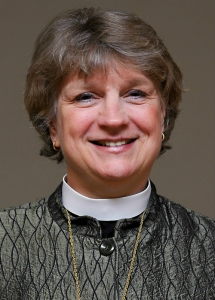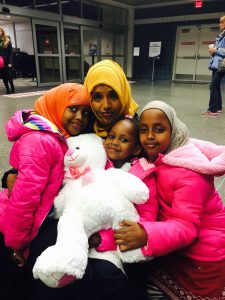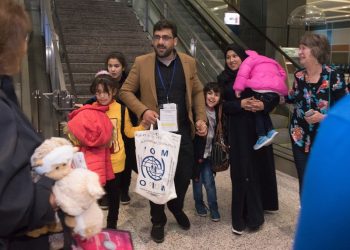 By Bishop Ann Svennungsen
By Bishop Ann Svennungsen
What joy I felt to see the Star Tribune’s picture of the Somali family reunited last Thursday. Peeking behind a teddy bear as big as she, a four-year-old girl stands embraced by her sisters and mother – together after more than three years of separation. Lutheran Social Services of Minnesota (LSS) played a major role in that reunion. Though she was set to arrive in U.S. on January 31, the four-year-old’s departure was denied because of an executive order suspending refugee arrivals from seven Muslim-majority countries. Fortunately, through the tenacity of LSS and others, the family was reunited last Thursday.
Amidst the swiftly changing landscape around immigration regulations (executive orders, judge’s decisions, appellate courts), we wonder how we might respond in a timely and loving manner.
The Lutheran church has a long history of both helping refugees and working for fair and generous immigration policies. Today, Lutheran Immigration and Refugee Services (LIRS) is the second largest resettlement agency in the entire United States.
Closer to home, LSS currently plans to resettle 655 refugees in 2017. Recognizing that many refugees are Muslim, LSS commissioned the remarkable study “My Neighbor is Muslim,” a welcome resource for individual or congregational study.
Augsburg College is home to a large population of refugee students and is clear about its mission of hospitality and justice. President Paul Pribbenow writes, “Augsburg’s history is rich with the contribution of individuals who came to America; indeed, founded by Norwegian immigrants, Augsburg has an immigrant sensibility and will stand firm in the face of threats to our community and our immigrant neighbors.”
As the world faces the largest refugee crisis since World War II (with some 60 million displaced persons), we have extraordinary institutions in our own city at work to provide welcome and safe haven. I encourage you to explore the LSS, LIRS, and Augsburg websites as you look for ways to “welcome the stranger.”
 OUR ELCA SOCIAL TEACHING (Immigration message and Immigration policy resolution) affirms that the United States should assume its proper share of international responsibility for the resettlement of refugees and other persons who have a well-founded fear of being persecuted – and to welcome them to the U.S. without discrimination based on race, religion, or national origin.
OUR ELCA SOCIAL TEACHING (Immigration message and Immigration policy resolution) affirms that the United States should assume its proper share of international responsibility for the resettlement of refugees and other persons who have a well-founded fear of being persecuted – and to welcome them to the U.S. without discrimination based on race, religion, or national origin.
No, our government has not specifically banned refugees on the basis of religion, but we seem to be treading very close. As we seek to be faithful today, it is wise to remember the words of another Lutheran in a country where there was official discrimination on the basis of religion – the religion of Judaism. In critiquing the German government, Bonhoeffer said, “We are not simply to bandage the wounds of victims beneath the wheels of injustice, we are to drive a spoke into the wheel itself.”
Amidst the swiftly changing landscape around immigration regulations (executive orders, judge’s decisions, appellate courts), we wonder how we might respond in a timely and loving manner.
As citizens, we can act as advocates for those vulnerable persons who are most deeply affected by government policies. The ELCA Advocacy office works with individuals and congregations interested in making themselves heard on behalf the marginalized, the oppressed, and the pilgrim.
Eventually, the system worked for the four-year-old reuniting with her family in the U.S. But, for every story like hers, there are many more that do not have happy endings. Knowing that each of us is a sojourner welcomed by the extravagant grace of God, may we be filled with wisdom to be moral leaders and courageous citizens in our day.

